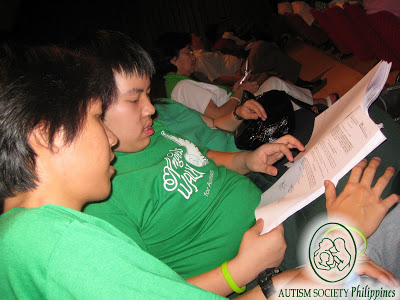Education for all, no child is left behind…this includes children with autism and other special needs,” said Ranil Sorongon.
Ranil is the ASP executive director and chairman of the Education Committee of the National Anti-Poverty Commission’s Persons with Disability Sector (NA PC-PWD).
UNESCO ’s Education for All (EFA) aims to meet the learning needs of all children, youth and adults by 2015.
This includes expanding and improving comprehensive early childhood care and education, especially for the vulnerable and disadvantaged children.
Angel Talker Lei-lani David contributes this report from the Chapter Leaders Conference of ASP held last August. Lei-lani, or Bing, was ASP’s project coordinator for Early Detection and Intervention Program and continues to be a committed ASP volunteer.
 |
| PWA Students Reading a city Ordinance for Special Children |
SPECIAL EDUCATION IN THE PHILIPPINES
Education is a fundamental human right. But the status of public special education (SPED) in the Philippines reveals a sad reality. It is faced with challenging issues which are basically systemic. Itincludes lack of funding irrelevant and unresponsive curriculum, mass exodus of SPED teachers, obsolete learning resources, lack of facilities, and the lack of support from school administrators.
Even more heartbreaking is that the whole school community is not ready yet to accept children with autism and other special needs. Parents of typical children in the public school question why students with disabilities are accepted and integrated with regular students.
In a regular public class, every child is competing with 60 more children.
The usual 60:1 student-teacher ratio complicates an already complex situation. Parents of regular students worry that the inclusion of students with special needs will aggravate the inadequate number of teachers and classrooms. Parents of children with autism, on the other hand, worry about how much quality time can be given to the special needs of their children.
DEPED’S RESPONSE
Basic education is free as stated in the Philippine constitution. The Magna Carta for Disabled Persons ensures that disabled persons are given access to quality education and sufficient opportunities to develop their skills.
The main challenge is how to make this accessible to the less fortunate, especially in the far flung areas of the country. And even in the urban areas, many parents cannot afford to send their children to private schools that accommodate students with special needs.
The DepEd is given authority, accountability and responsibility for ensuring access to, promoting equity in, and improving the quality of basic education. The DepEd is currently strengthening its special education programs to address children with special learning needs. It has been conducting Special Education Personnel Enhancement Training Programs for inclusive education.
As part of DepEd’s thrust to democratize access to public education services, more than 900 SPED teacher items were provided since 2007. It is creating capability programs and promotion opportunities for SPED mentors. However, there are only 217 SPED centers all over the country that serve the needs of special children.
SOME SOLUTIONS
In a meeting in Dakar, Senegal in April 2000, the participants in the World Education Forum commit themselves to the achievement of education for all goals and targets for every citizen and for every society.
The Dakar Framework is a collective commitment to action. Governments have an obligation to ensure that EFA goals and targets are reached and sustained. This is a responsibility that will be met most effectively through broad-based partnerships within countries, supported by cooperation with regional and international agencies and institutions.
Here in the country, concerned educators, administrators and teachers offer some solutions on how to address the problems:
a. Require regular teachers in public schools do take units in Special Education.
b. Provide trainings to teachers on how to handle and educate children with autism. c. Allow caregivers or parents to observe and to assist the teachers.
d. Parents and advocates should inform the legislators on the need to allocate more funds for Special Education.
e. Parents should be vigilant in asserting the right of their children to education
REASONABLE ACCOMMODATION
The “Enhanced Guidelines for Quality Education for Learners with Special Needs” is now with the Commission on Higher Education for final review and hopefully for final implementation for the next school year. The guidelines include “reasonable accommodation” for students with disabilities and support services from colleges and universities where they are enrolled.
Reasonable accommodation is defined as “necessary and appropriate modification and adjustments not imposing a disproportionate or undue burden, where needed in a particular case, to ensure to persons with disabilities the enjoyment or exercise on an equal basis with others of all human rights and fundamental freedoms”. The United Nations used this term in the Convention on the Rights of Persons with Disabilities (CRPD). The CRPD is an international human rights instrument of the UN intended to protect the rights and dignity of persons with disabilities.
They have defined that even saying no to reasonable accommodations is already discrimination.
No child left behind… this seems to be a remote chance in the past. The UN ESCO EFA goals should be postponed no longer. The basic learning needs of all can and must be met as a matter of urgency. Instead of saying “to see is to believe”, let us all work together for to believe is to see.
On Oct. 16, educator My Sorongon conducts ASP seminar-workshop on “Caring for the Caregivers” while author Christine Roa facilitates the monthly family support group meeting.
ASP Cebu Chapter hosts 2nd Regional Conference on Autism, “The Spinning Truth behind the Spectrum,” on Oct. 23-24, at SM Cebu Trade Hall featuring at least 13 well-known Metro Manila and Cebu practitioners and advocates. For more details, visit autismsocietyphilippines.blogspot.com.
Uploaded with permission by Manila Bulletin,
No Child Left Behind…Including Those with Autism.


1 comments:
For now my child is under a home study program making sure he is not left behind. He is now in grade 3.
Post a Comment